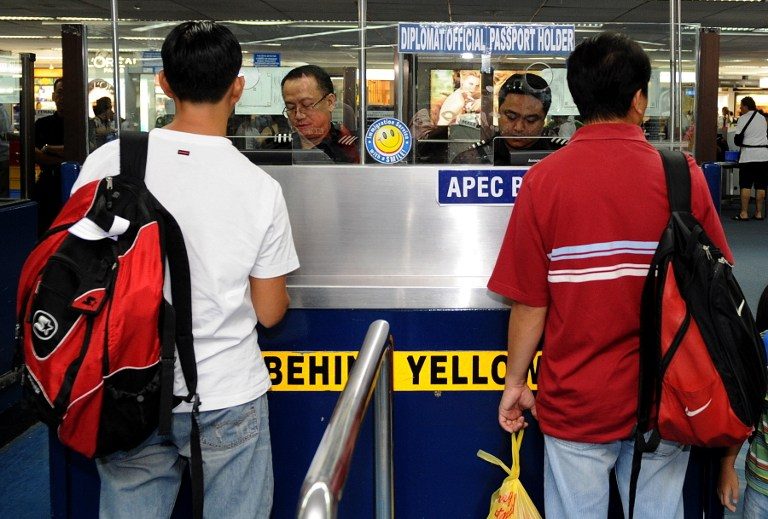SUMMARY
This is AI generated summarization, which may have errors. For context, always refer to the full article.

MANILA, Philippines – The Bureau of Immigration’s (BI) system of “screening” of passengers for suspected human trafficking cases in the country’s exit points – popularly known as offloading – is “not foolproof,” the agency’s head admits.
The US State Department, in its 2015 Trafficking in Persons report, cites the agency’s screening efforts but said the system is “indiscriminate” and could be infringing on people’s right to travel.
As part of government efforts to stop the smuggling of Filipinos to foreign countries, suspected victims of human trafficking are prevented from departing the country by being invited for further questioning by trained immigration personnel.
Some passengers are asked to leave the plane minutes before it departs.
But the system is “not foolproof,” admits Immigration chief Siegfred Mison. There could be errors in judgment by those tasked to monitor the cases.
The bureau is part of the Inter-Agency Council Against Trafficking (IACAT). BI personnel are situated in the country’s entry and exit points in direct contact and communication with passengers bound for abroad.
Released Monday, July 27, the United States’ 2015 Trafficking in Persons (TIP) noted the bureau’s efforts in screening “potential victims at airports and seaports.”
The report, however, noted that “this indiscriminate screening mechanism may be indicative of the government unduly restricting Filipinos’ right to travel outside the country.”
‘Deferred departure’
Mison said the bureau has done away with the term “offloading” and would rather use “deferred departure.”
He said there are existing trainings for immigration personnel to detect “all kinds of schemes.”
He added that by the time victims are ready for departure, “90% of the battle is already lost.” The victims had already been duped, often having paid his or her illegal recruiter steep prohibited fees.
“But still, it’s very important for us deferring the departure of some of our kababayan (countrymen),” he said as a cautionary measure.
He noted how human trafficking syndicates prey on the poor and vulnerable job-seeking Filipinos. “It costs us so much to rescue, repatriate these people,” he added.
Migrant workers’ rights advocate Susan “Toots” acknowledged there is bound to be some “margin of error” but it is better to err on caution’s side. (READ: How to report suspected cases of human trafficking)
Even one of her businesswomen-friends had been offloaded once for this reason, she said.
3 screening levels
Over at the BI, Mison said there is “primary, secondary, and tertiary inspection” of suspected human trafficking cases.
The primary inspection asks “very basic” questions to determine if “the purpose of travel is legitimate.”
A “red flag” in the 45-second interview could lead to a referral to the secondary inspector, who is trained to detect from the suspected victim’s “manner of answering” if he or she was earlier coached to answer in a particular way.
The 10 to 20 minutes of verification looks at the demeanor of a person, among other indicators including whether or not the suspected cases traveled in groups and are still escorted despite being old enough to travel alone.
At the tertiary level, where suspected victims are already asked for supporting documents, Mison said one will “be surprised” as “they are bold enough to submit fake overseas employment certificates.”
Mison admits the matter of deferred departure is “really a judgment call” but adds that the bureau will do its work “without fear or favor.”
He added that BI’s screening effort is only one aspect of the fight against human trafficking.
He said “proper disciplinary action” still awaits abusive immigration personnel, who may be “dismissed” or “suspended” depending on the evidence against him or her.
If the officer is merely accused of “pure arrogance” or being “disrespectful,” Mison said the BI could “assign him or her to somewhere else to minimize contact with customers or passengers.”
The Philippines is a source country in cross-border human trafficking, but it has maintained its place at Tier 2 of the TIP’s 3-tier ranking for sustained efforts in fighting the social menace.
People smuggling in the Philippines often starts with illegal recruitment and the promise of overseas employment. (READ: Desire to work abroad exploited by human traffickers)
Work abroad is seen by many Filipinos as a magic bullet to end poverty – a mindset ethical recruitment advocates seek to eradicate. (READ: Ex-OFW, now business owner, tells OFWs: Plan your return)
The Philippines is a known labor-sending country, with over 10.5 million Filipinos permanently residing or temporarily working in foreign countries. (LISTEN: PODCAST: Ethical recruitment of OFWs)
The TIP report is an annual report detailing measures against modern slavery done by countries around the world. – Rappler.com
Add a comment
How does this make you feel?
There are no comments yet. Add your comment to start the conversation.